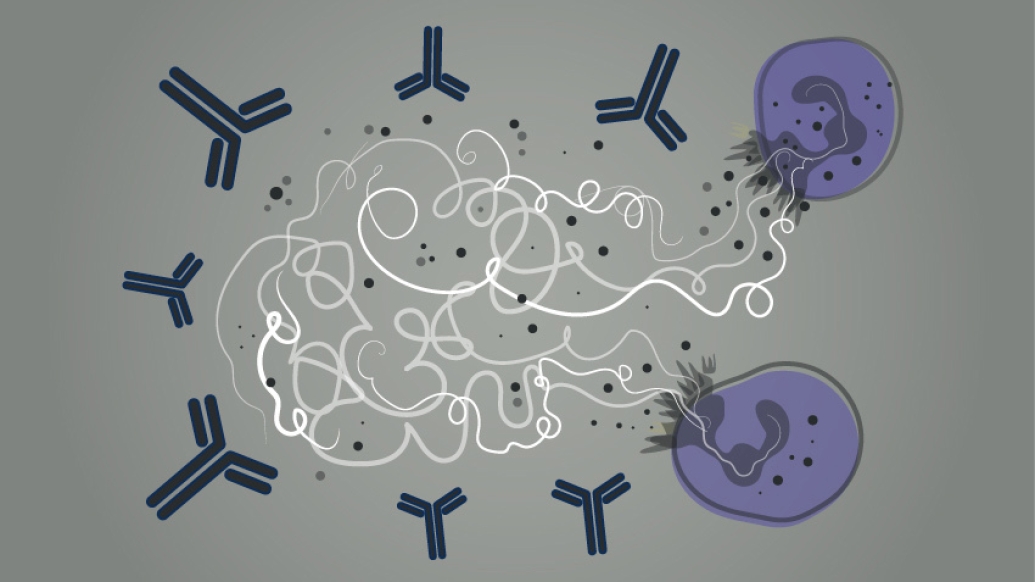The finding will likely help physicians develop targeted therapies for future COVID patients.
1:45 PM
Author |

Researchers at Michigan Medicine have discovered yet another functional autoantibody in COVID-19 patients that contributes to the disease's development and the "firestorm" of blood clots and inflammation it induces.
A growing body of studies suggests COVID-19 emulates many aspects of systemic autoimmune disorders, including the release of a flurry of overactive immune cells that produce toxic webs of proteins and DNA called neutrophil extracellular traps, or NETs.
For this study, the team analyzed serum from over 300 hospitalized COVID patients, searching for a novel autoantibody that shields the toxic NETs from being destroyed and produces a lasting noxious effect in a patient's body.
The results, published in JCI Insight, reveal markedly elevated levels of the anti-NET antibodies in many of the participants. Those with higher levels of the autoantibodies were more likely to develop severe COVID-19 symptoms.
"We see a slew of different antibodies produced in COVID-19 patients, and now we discovered another clinically significant one that is likely contributing to severe COVID," said Yu (Ray) Zuo, M.D., lead author and a rheumatologist at Michigan Medicine. "They feed into the inflammatory storm that we're seeing in the most serious cases of viral infection."
SEE ALSO: Higher Levels of NETs in Blood Associated with More Severe COVID-19
Researchers generated NETs in the lab and incubated them with COVID patient serum. They found the serum from patients with higher levels of anti-NET antibodies struggled to degrade the toxic traps.
The team also spiked healthy serum with anti-NETs purified from the infected patients. While a healthy person's serum should completely disintegrate the extracellular traps, the purified anti-NET antibodies significantly hindered the process.
"We knew that people with severe forms of COVID have higher amounts of these neutrophil extracellular traps, which amplify inflammation and promote blood clot formation," said Jason Knight, M.D., corresponding author of the paper and an associate professor of rheumatology at Michigan Medicine. "We've now found that this process is exacerbated by the anti-NET antibodies, which disrupt our body's immune homeostasis during COVID-19 infection."
Similarities to another autoimmune disease
Zuo and the Michigan Medicine team previously reported the presence of anti-NETs in patients with antiphospholipid syndrome, a systemic autoimmune condition characterized by severe blood clots and recurring pregnancy loss.
The anti-NET antibodies, which are likely associated with the development of recurrent blood clots and more severe disease in antiphospholipid syndrome, showed remarkably similar function in this study of COVID-19 patients, said corresponding author Yogen Kanthi, M.D., a cardiologist and vascular medicine specialist at the National Heart, Lung, and Blood Institute and Lasker Investigator at the National Institutes of Health.
Studying these [COVID-induced] antibodies will also teach us about the mechanisms of autoimmunity in general, especially in the field of rheumatology.Yu (Ray) Zuo, M.D.
"In both diseases, the anti-NET antibodies coat the surface of the neutrophil extracellular traps, making it much harder for the body to clear out this web that causes inflammation and clotting," Kanthi said. "Knowing their function is likely to help physicians design more targeted COVID-19 treatments and also for other inflammatory diseases."
How COVID-19 manages to trigger the production of a variety of autoantibodies, including anti-NETs, remains unknown. Further study of the virus' autoimmune aspects, Zuo noted, will not only lead to better understanding of the disease, but will also likely shed light onto the origins of autoimmune diseases.
Future research and "long COVID"
The paper's findings may also unlock other COVID mysteries, including the persistence of symptoms in some people months after clearing the virus, a phenomenon known as long COVID, Zuo said.
The team is currently conducting a follow-up study, calling back patients who were previously hospitalized to repeat testing for the anti-NETs and other autoantibodies that formed during their hospitalizations.
Previously, they found durable anti-NET antibodies that persisted in antiphospholipid syndrome patients for up to four years. The team will investigate if and how the autoantibodies influence long COVID, the post-acute sequalae of the virus marked by symptoms like brain fog, fatigue and shortness of breath.
SEE ALSO: New Cause of COVID-19 Blood Clots Identified
While vaccination is doing its job to limit severe infections and hospitalizations, millions still feel the effects of long COVID, which is why this research is so important, Zuo said.
"The better we understand these COVID-induced autoantibodies such as anti-NET antibodies, the more equipped we will be to fight COVID-19 at every stage of viral infection," Zuo said. "Studying these antibodies will also teach us about the mechanisms of autoimmunity in general, especially in the field of rheumatology."
Paper cited: "Autoantibodies stabilize neutrophil extracellular traps in COVID-19," JCI Insight. DOI: 10.1172/jci.insight.150111

Explore a variety of healthcare news & stories by visiting the Health Lab home page for more articles.

Department of Communication at Michigan Medicine
Want top health & research news weekly? Sign up for Health Lab’s newsletters today!





